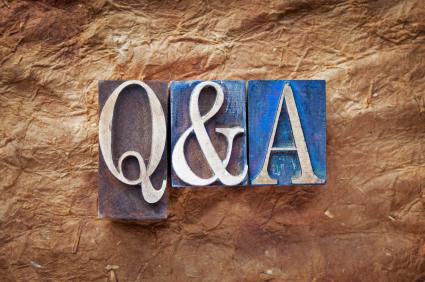Reader Email 2: How Do You Handle Negative Comments?
You’re a jerk. An idiot. A poser. A moron. A dumbass.
If you’ve blogged long enough, you’ve probably been assaulted by a few readers who disagree with your conclusions. And that can lead to a few challenges for bloggers who want to allow a free exchange of ideas but also insist upon a civil discourse.
Reader Mary Denihan noticed that challenge, and asked the following question regarding managing a website’s comments section. Mary wrote:
“It almost seems like [negative comments] have overtaken some sites. Which in turn, seems to inhibit other folks with positive opinions to not comment. Do you have any advice on how to avoid your site to be overtaken by negative comments?”

Reader Leigh Ann Otte was also curious, writing:
“I would guess (hope?) most people recognize what’s going on and don’t listen to them. But it is a good question: What do you do if the negativity is directed to you? Ignore it? Respond once to everyone? Try to cut it off early by responding to the first few right away?”
Great questions, Mary and Leigh Ann! Here are three ways you might consider approaching this issue:
1. Ban Belligerent Jerks
There’s no rule that says bloggers have to approve every comment someone leaves. For this blog, I created a comments policy titled “No Jerks Allowed.” It reads, in part:
“I’m done posting ad hominem attacks, off-topic comments, comments that refer to elected officials (or others) in pejorative terms, comments that are unnecessarily antagonistic, comments that don’t relate to the topic of the article, and other comments that come across with more hostility than substance.
There is no shortage of websites and news channels that profit from hostile and angry debate. No matter how many times I’m accused of censorship, I’m not going to allow this blog to join their ranks.”
2. Respond, But Speak Past The Commenter
If I decide to post a negative comment from a reader (because it makes a valid point, even if it’s a bit nasty), I try to be mindful that the entire audience may hold a rude response against me. If I treat the person with respect (in some cases, more than they deserve), readers are more likely to be impressed with the tone of my reply—even if they, too, disagree with my view.
Therefore, I try to remember that the writer of that letter is not my target audience. Sure, my response is addressed to the commenter, but my communication is really intended for the rest of the blog’s readers.
3. Or, Speak To The Commenter
If the commenter posts something negative but appears to be reasonable, I try to give them the benefit of the doubt.
I often find that the tone of a reader’s first comment may be negative, but that if I respond to them respectfully, their follow-up comment is milder—or even appreciative.
That approach is backed up by a 2011 Harris Interactive study, which found that unhappy customers quickly forgave companies that responded to them. Thirty-three percent of customers who left a negative review on a shopping website ended up posting a positive review after receiving a response, while another 34 percent deleted the original review.
What do you think? How have you handled negative comments on your personal blog or company website?

On a public forum, I think #2 is the way to handle it. #3 works in certain situations, but if the person is truly unreasonable, it can just prompt more negative comments as he argues with you point by point.
Alas, #1 never works. They just come back with a new name. One way around it is to hide the jerk’s comments from everyone… except the jerk! Unless he logs in as a different person, he can’t tell his comments are invisible to everyone else.
Craig,
I’m intrigued by your approach to make a commenters posts “invisible” to everybody else. How does one go about doing that?
Thanks for the smart comment,
Brad
Hi Brad,
Thanks for the thoughtful response. Each one has value for different situations. We have taken down several extremely negative comments and blocked several people on Facebook (I work for a government agency)
We’ve found that #3 works for negative comments and that people do appreciate our responses. It does soften them.
I’ve seen some web sites do that. In TechDirt.com, for example, there’s a button where readers press and vote to make someone’s comment invisible.
Slightly above that person’s comment, there’s a button (with a short warning) one can click to make that comment visible again and read it if s/he feels inclined. Of course, there’s another button to hide it again.
Don’t know if there’s maybe a plugin in WordPress that does that. I imagine there is, though, or someone’s working on it.
I write about an oddly controversial subject–the movement to end the killing of homeless pets in shelters. My comments would start looking pretty crazy pretty quickly if I let them, and I think that would be off-putting to those first learning about this subject. In my particular arena, a handful of very noisy, truth-challenged and rude individuals spend an inordinate amount of time trying to stir up controversy. They are pretty easy to spot, even when they engage in ‘sock-puppeting’. I created a comment policy in which I pre-moderate all new commenters and I am unapologetic about my contempt for those who make excuses and unsubstantiated negative claims or deliberately attempt to spread falsehoods–I may let them through moderation, but won’t be nice about it. My philosophy is that the blog comments should offer nothing but an opportunity to have a rational discussion that deepens everyone’s understanding of the topic. That may include exposing the occasional hater, but the novelty of doing so has worn off, so unless they furnish me with a particularly entertaining teachable moment, they don’t merit publication.
Valerie,
I love this line:
Couldn’t have said it any better myself. Thanks for adding your thoughts to the blog.
Brad
I am very happy that we’ve only had one negative comment on our non-profit agency’s Facebook page. I saw the comment and responded, thank you so much for bringing this to our attention and directed him to contact me directly at my private, company email to provide more details about the situation so that we could resolve the issue for him.
Before launching our social media page, I attended a seminar that said, don’t be afraid of negative comments – it’s much better that these are directed to you (even if publicly) than to friends or go unmentioned. You can’t fix the problems you don’t know exist. That said, the presenter’s next sentence was always be courteous to the poster and show a sincere effort to resolve the problem and show your good will.